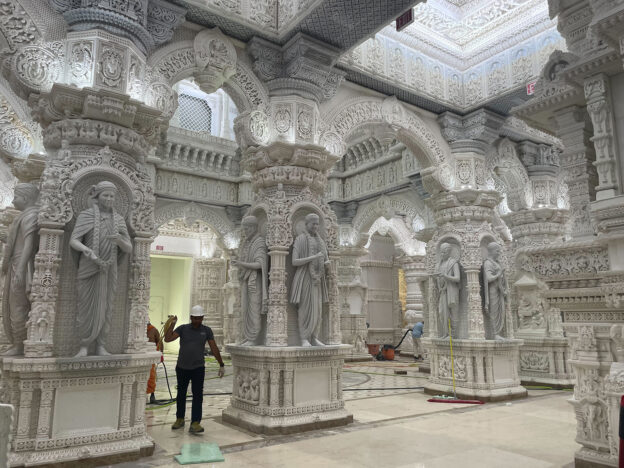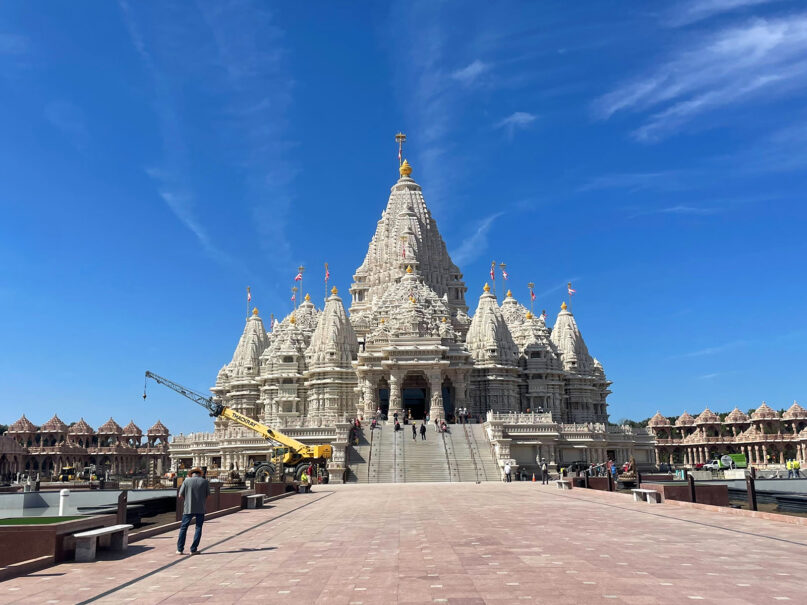
(RNS) — The Department of Justice has dropped its investigation of a New Jersey Hindu temple, the temple’s leaders announced Thursday, more than four years after law-enforcement agents raided the complex following accusations that it was being built with forced labor.
The BAPS Swaminarayan Akshardham in Robbinsville, New Jersey, the largest Hindu temple in the Western Hemisphere, was still under construction at the time. It was completed in 2023 with the help of more than 12,500 people from North America and other countries over 12 years. Most had no construction background, and temple officials claimed they considered theirs to be spiritual service.
“The United States Government’s decision to end this investigation sends a clear and powerful message in support of what our organization has maintained from the outset: that BAPS Swaminarayan Akshardham — a place of peace, service, and devotion — was built through the love, dedication, and volunteer service of thousands of devotees from all walks of life,” read the statement.
“As our scriptures have guided us for thousands of years,” it added, ‘Satyameva Jayate’ or ‘truth will always prevail.'”
In May 2021, New Jersey police and federal agents descended upon the 126-acre campus after six Indian workers filed a civil complaint that they were forced into performing heavy construction work for long days with less pay and time off than they were promised. These sevaks, or volunteers, were brought, with nearly 200 others, from India on R-1 visas for “non-immigrant religious workers.” They alleged that they were forced to live on temple grounds, and their passports were confiscated.
An amended complaint against BAPS later that year added 15 more plaintiffs, but 12 voluntarily withdrew from the lawsuit, saying they were misled by lawyers into joining. According to leaders in the BAPS community, talks between the FBI and their legal counsel began earlier this month, resulting in the closing of the investigation with no charges.

FILE – The BAPS Akshardham temple complex in Robbinsville, New Jersey, Wednesday, Sept. 20, 2023. (RNS photo/Richa Karmarkar)
Lenin Joshi, a volunteer with the BAPS Akshardham, said the temple community was “shaken” by the raid. “We’ve been through this whole construction phase,” Joshi told RNS on Friday. “I’ve been on the temple grounds until late. I have discussed and had food with these people, and we had fun with them.
“I had no doubts that this is all a big mistake.”
Sevaks are at the heart of the BAPS community, which has been in the United States for more than 50 years and has opened more than 100 temples. BAPS members follow a spiritual lineage of gurus starting with Bhagwan Swaminarayan, an 18th-century ascetic, and make up one of the most prominent Hindu denominations.
Yogi Trivedi, a scholar of Hinduism at Columbia University and BAPS practitioner, said cultural and religious mistranslation has complicated the labor allegations. The concept of seva, a central tenet of this sect of Hinduism, does not translate directly to Western concepts of volunteerism.

FILE – Construction crews work on the interior of the BAPS Akshardham in Robbinsville, New Jersey, Wednesday, Sept. 20, 2023. (RNS photo/Richa Karmarkar)
“The purpose of Seva is not to just complete a project,” he told RNS. “It’s not just to provide community service or just to be a humanitarian. It’s actually to better yourself and come closer to the Divine by realizing yourself, your soul.
“When I saw thousands of sevaks give so much of their life to essentially move their families here to come and serve, I couldn’t but feel remorse at the fact that their service was misinterpreted, or the concept that drove them to be the way they are now was being misunderstood.”
The initial case, which referred to the plaintiffs as “lower caste,” has become a flashpoint for discussions of casteism in the diaspora. Ronak Patel, a BAPS spokesperson, said this dynamic does not apply to the BAPS community nor this situation.
“The faith began with that principle that was established by Bhagwan Swaminarayan, that there is no caste hierarchy,” Patel told RNS. “And then Mahant Swami Maharaj absolutely codifies that same principle and says no one is superior and no one is inferior by birth. We are all equal here to serve and worship God.
“To twist some belief system that may exist in some parts of the world and say that what the entirety of the faith stands for is simply wrong,” he added.
Patel said BAPS officials continue to pray for the workers who filed the original case. “They are sevaks,” he said. “They’re just like us, and at the end of the day, we wish them nothing but the best.”
Though the DOJ investigation is now closed, the civil case will resume in federal court at an unscheduled date, though Patel and others say they are confident in a similar outcome to the criminal investigation.
“At the time, I had told media that the accusations are without merit, and when all the facts come out, we will be able to provide answers and show that,” said Joshi. “For me it’s like, we told the truth, and now the FBI has confirmed what we said since day one.”
Hindu advocates expressed joy in the vindication of the BAPS community, which has also been the target of a slew of vandalism incidents. “This marks a significant victory for the Hindu community in America, which has endured a campaign of calumny designed to malign our faith, our temples, and our institutions based on this unproven allegation,” said the Coalition of Hindus of North America in a press release.
Suhag Shukla, executive director of the Hindu American Foundation, posted on X: “The @BAPS community was forced to endure false, horrific allegations of forced labor & casteism. Will we ever see an apology for this monstrous, catastrophic episode? We won’t hold our breath.”
Trivedi said the BAPS saga may be “a moment of reckoning for the larger American community, but also a moment of important bridge building and lesson learning for the Hindu American community.
“What I’ve seen in the community around us is that experiences like this have helped strengthen the flame of faith,” he said. “The community has learned to draw a connection with, to draw from, and to engage with the broader non-Hindu community in central New Jersey and the greater Northeastern region of the United States, and honestly the world.”
